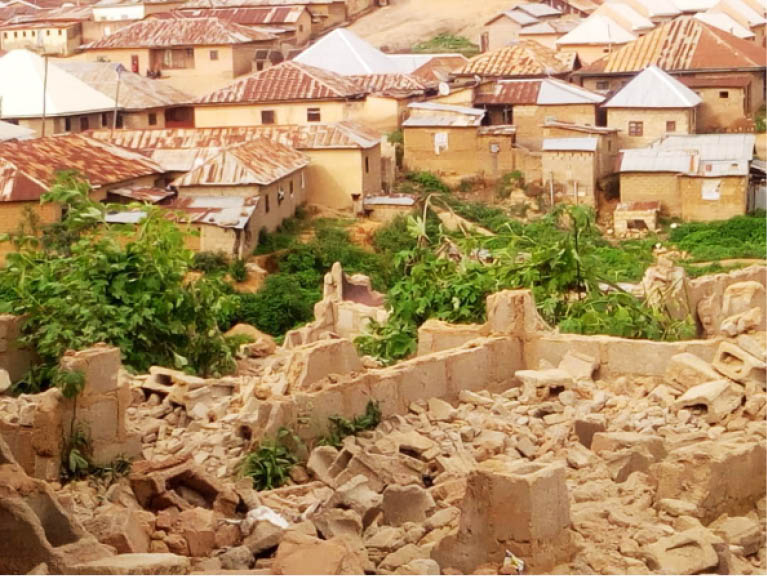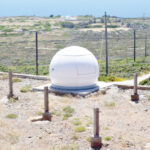Boundary communities in Jos-north Local Government Area of Plateau State are becoming the most notorious flash points for sectarian crisis in the city. With the slightest misunderstanding quickly turning into an ethno-religious violence, residents of Dutse Uku, Tina junction, Unguwar Damisa and Cele-Bridge, speak of groups of hooligans in the areas, who turn their internal squabbles into a business for all.
Dutse-Uku,Rikkos, Unguwan Damisa, Tina junction, and Cele-Bridge, are boundary communities harbouring some of the most notorious hoodlums in Jos, the Plateau State capital, Daily Trust on Sunday gathered.
With heavy population of idle youths who find solace in drugs and hooliganism, these communities, unless checked are daring to return Jos to the ugly days of sectarian crisis.
In the last eight months, three disturbances connected to the areas turned religious and led to killings and destruction of properties worth millions of naira. Last Sunday, residents of Jos, were again greeted with a civil unrest emanating from the areas. Police said six persons were killed and many houses set ablaze. The discovery of the corpse of one Enoch Monday around Anguwan Damisa near Rikkos in Jos-north had sparked a round of reprisals on persons perceived to be enemies. The riot quickly took a religious coloration as Christian and Muslim youths attacked, killed and destroyed properties belonging to those of opposite faiths, it was further gathered.
The skirmishes were largely done at the edge of boundaries of perceived rival communities where on a good day, the youths come together to take part in various social activities, irrespective of religious and tribal inclination.
While the areas reeked of death and smoke, the rest of Jos, carried on its activities as though nothing was happening. This explains why Governor Simon Bako Lalong commended both residents and security agents for ensuring that the crisis did not spill over to other parts of the state capital. Lalong praised the resolve of citizens to resist being lured into violence and stressed that their ability to work with security agencies to prevent the crisis from spilling was a testimony of the deepening peace building efforts of government and people of the state.
Our correspondent gathered that many people who had gone for Sunday Church Service were trapped outside the frontlines and had to wait out several hours for the situation to be brought under control before getting home. In March, a corpse found dumped in a well had sparked a round of tension in the area, just six months after a similar occurrence led to skirmishes in late September last year. The September incident had occurred after the killing of a youth on a motorcycle around Cele-Bridge, two days after a riot broke out following the killing of 11 persons around Rukuba road in Jos.
However, unlike what happened in September, the incident in March had quickly been decimated by security agents who dispersed youths who were already mobilizing to launch reprisal attacks. The situation was however different last week as youths quickly pounced on their perceived opponents before the arrival of security agents.
A resident of Tina Junction told our correspondents that it was gradually becoming a norm for the sight of a corpse irrespective of the circumstance of death to trigger a religious crisis, especially when the youths and the victim share the same faith.
But there are however those within the affected communities who alleged that until his death, the man whose corpse sparked the crisis had equally been part of a notorious street gang and may have been killed by members of a rival group.

A youth leader from Tina Junction told our correspondents that those responsible for triggering the crisis were members of various groups who knew themselves and often met at several spots to smoke Indian hemp and take other illicit drugs.
“The incident may have been due to a rivalry between the Muslim and Christian gang members but made to look like a religious crisis,” said the youth leader. He added; “when they come together for their criminality, there is no Muslim or Christian, but once something happens, they turn it into a religious war in which a lot of innocent people are caught in the web.”
The youth leader, who preferred anonymity for fear of backlash said the boys have what he called antisocial fellowship, but stressed that the slightest squabble among them could lead to laying an ambush to kill a member which often turns communal when the corpse is discovered.
“They need to give the crisis a religious colouration to spread it and give opportunity for others with malicious intentions to join in and perpetuate nefarious acts,” he said.
His analysis was backed by the youth leader of Dutse-Uku, Idris Khamis Mangalle, who said, “both sides have their gangs, they meet for their social events but when there is a misunderstanding and a Muslim gang member kills a member of his faith or a Christian gang member kills a member of his faith, there is no problem. But the moment a member of a rival group kills a member of a different faith, they turn it into a communal and religious crisis.”
Mangalle, who was one of the first persons notified on the discovery of the corpse, said; “the body was found along Unguwar Damisa near a river and I immediately got in touch with Operation Safe Haven, Sector 1 and the police DPO, but before they arrived, the youths had already launched attacks.”
Since 2001, crisis in Jos have taken ethno- religious dimensions. Sentiments, divisions often fuelled by grudges from previous crises have sharply divided the city into Christian and Muslim dominated areas with a few communities such as Dutse-uku, Rikkos, Tina and Cele-Bridge often found at the edge.
The Sunday incident, it was gathered lingered from morning into late afternoon as residents attempted to defy security presence. They were eventually subdued when reports began to filter in that men of the Special Forces Team (SFT), mostly referred to as the ‘fearless bikers’ attached to the Operation Safe Haven had stormed the general areas. On sighting the bikers, residents began running into their homes. Heavy gunshots were also heard throughout the area.
By Monday morning, youths who were found in gatherings, were swiftly picked up by security agencies, an action which prompted a response from some women who came out in black, carrying leaves to protest what they described as indiscriminate arrests. But the security agents did not budge, as they quickly arrested and bundled the women into trucks before they were later released.
The Operation Safe Haven Commander, Major General Augustine Agundu, said the breakdown of law and order was due to the activities of hoodlums under the influence of drugs and other substances. General Agundu said the taskforce had made some arrests in connection with the crisis but was screening the suspects. He said security agents have been inserted in the affected communities and stressed that the security breach means he would have to re-engineer the security situation in Jos-north to stop future occurrence.
Mangalle however said the only way to resolve the issues in the affected communities permanently was for government to issue threats of arrest to community leaders who are unable to identify and handover youths involved in crimes to security agencies.
He lamented that parents and some community leaders were being sentimental and would rather protect their wards even when they know they are into crimes.
“We have to remove sentiments if we want peace and though a military station in between the communities would to a large extent curb rising tensions, we have to find a permanent solution to the crises because the soldiers cannot remain with us forever,” he said.




